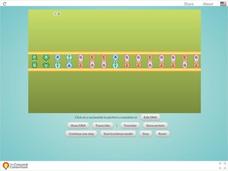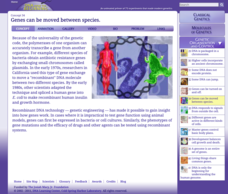Concord Consortium
Mutations
Are some mutations more damaging than others? An engaging simulation encourages scholars to alter DNA through insertion, deletion, and substitution. It then forms resulting amino acids—or not—and the resulting protein—or not—depending on...
Cold Spring Harbor Laboratory
Mutations Are Changes in Genetic Information
A red delicious apple tree with a simple mutation means we now benefit from the existence of golden delicious apples. Learn how simple mutations change genetic information in DNA sequences. Using biographies, videos, and animations,...
Cold Spring Harbor Laboratory
Some Types of Mutations Are Automatically Repaired
Does natural light damage or repair DNA? Learn the answer discover the scientists who researched the topic with an online interactive. Scholars read through an online animation presenting the content at their own pace. Then, they read...
Cold Spring Harbor Laboratory
Genes Can Be Moved Between Species
Biotechnology changes lives every day, but how did it all start? Learn about Cohen and Boyer's technique for recombinant DNA and the founding of this new scientific study. Then, scholars use the online interactive to discover how Hanahan...
Howard Hughes Medical Institute
RNA Diversity
Messenger RNA, transfer RNA, and ribozymes ... the many faces of RNA. The structure of RNA makes it much more versatile than the very similar DNA. Learners view a slideshow presentation to learn all about the different forms and...
Cold Spring Harbor Laboratory
Living Things Share Common Genes
Everything evolved from a common ancestor, but how did modern plants and animals develop so many more genes? Scholars use an online interactive to learn about the process. They begin to understand common genes with an animation, multiple...
Concord Consortium
The Molecular Logic Database: Mutations: Changing the Genetic Code
Students will learn about the different types of mutations and how they work. They will compare the effect of these different types of mutations in DNA, including nucleotide substitution, nucleotide insertion, and nucleotide deletion....






